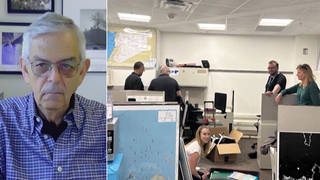
Guests
- Grace Lee Boggs94-year-old philosopher and activist based in Detroit. She has been involved with the civil rights, Black Power, labor, environmental justice, and feminist movements over the past seven decades. Her autobiography Living for Change was published in 1998. Monthly Review Press has just republished two books by her late husband Jimmy Boggs with new introductions written by Grace.
- John Bellamy FosterEditor of the journal Monthly Review and a professor of sociology at the University of Oregon. He is the author of several books, including The Great Financial Crisis and The Ecological Evolution: Making Peace with the Planet.
While Wall Street appears to be recovering from the financial meltdown, Main Street has not. We speak to two guests who for decades have advocated for a radical rethinking of how the nation’s economy is structured: Grace Lee Boggs, a ninety-four-year-old Detroit-based philosopher and activist involved with the civil rights, Black Power, labor, environmental justice, and feminist movements for the past seven decades; and John Bellamy Foster, editor of the socialist journal Monthly Review and a professor of sociology at the University of Oregon. [includes rush transcript]
Transcript
JUAN GONZALEZ:
A year ago this week, Lehman Brothers collapsed. Wall Street fell into a state of panic as it became evident that the nation was suffering its worst economic crisis since the Great Depression.
A year later, little seems to have changed on Wall Street. Goldman Sachs is preparing to hand out high bonuses again this year. The 30,000 employees at the investment bank will take home on average $700,000 this year. Just yesterday, the Bloomberg news agency reported credit-default swaps have lost their stigma on Wall Street, even though it was this type of risky bet that led to the financial crisis just a year ago.
While Wall Street appears to be recovering from the crisis, Main Street has not. The official unemployment rate is expected to top ten percent this year. In Michigan, it’s at already above 15 percent. In Philadelphia, the city is threatening to shut down its public library system in early October. In California, hundreds of faculty, students and staff from the University of California’s ten campuses have called for a system-wide walkout next Thursday to protest the university’s handling of its budget crisis. Cities and states across the country are cutting back on essential services.
AMY GOODMAN:
For the rest of the hour, we’re joined by two guests who, for decades, have advocated for a radical rethinking of how the nation’s economy is structured.
Grace Lee Boggs was with us — is with us right now, philosopher, activist, just celebrated her ninety-fourth birthday, big parties in Detroit and in Chicago. She was born in 1915 to Chinese immigrant parents. For the past seven decades, she’s been involved with the civil rights, Black Power, labor, environmental justice, and feminist movements. Her autobiography Living for Change was published in 1998. Monthly Review Press has just republished two books by her late husband Jimmy Boggs with new introductions written by Grace.
We’re also joined by John Bellamy Foster. He is editor of the socialist journal Monthly Review and professor of sociology at the University of Oregon. He’s the author of several books, including The Great Financial Crisis and The Ecological Evolution: Making Peace with the Planet.
Both Grace Lee Boggs and John Bellamy Foster are speaking tonight at the New York Society for Ethical Culture at an event to mark the sixtieth anniversary of the Monthly Review.
We welcome you both to Democracy Now! —
GRACE LEE BOGGS:
Thank you.
AMY GOODMAN:
— in a time of, well, you might say, great crisis and also opportunity. Grace Lee Boggs, how would you describe where we stand now and how we’ve gotten here?
GRACE LEE BOGGS:
Well, I think we’re in a time of great hope and great danger. I think that the danger is largely underestimated. I think that at a time when thousands of people descend on Washington saying we want our country back and calling, denouncing Obama as a socialist, that it has become very important for us not to talk about a recovery, but to talk about how do we create a new society of hope.
And I think that’s why Monthly Review is so important, because it’s been for six years trying to create an independent approach to socialism that is not bogged down in ideas that come from the nineteenth century or from the 1917 revolution.
And I think that the only answer to the counterrevolution, which Bertha Lewis and others are trying to defend ourselves against, is to begin creating a new concept of hope, not to talk about recovery. We don’t need to go back to a society that is concentrated on economic growth, that dehumanizes us, that makes us consumers only and is threatening all life on this planet. We need to be thinking about something new.
And we need to have a deeper appreciation of the witch hunts that are taking place, and that — Van Jones and Bertha Lewis, and understand that these are taking place at a time of great danger to the powers that be, that the powers that be have lost two wars, that the situation is much more comparable to that of Germany in the ’30s than to anything that the American people have experienced up to now.
JUAN GONZALEZ:
And when you say “a new society of hope,” how you distinguish that from, let’s say, the movement that brought President Obama to power, which is talking about change, the difference between change now that it’s being attempted versus your vision of a society of hope?
GRACE LEE BOGGS:
Well, I think it’s fortunate that we have Obama in power, not because he’s going to do very much. I think the contradiction between his rhetoric and his practice is very profound. I think it’s very tied into his personality. But what he does is, by virtue of his — actually, in the White House, carrying on the policies, essentially, of the previous administration, especially with regard to war, is that he’s forcing us really to go beyond him to understand his limitations. He’s — in a sense, he’s an opportunity; he’s also a danger, as every crisis is.
AMY GOODMAN:
And John Bellamy Foster, your analysis of what’s happening now and where your publication, Monthly Review, fits in?
JOHN BELLAMY FOSTER:
Well, in terms of the economic crisis, I think our analysis is that the usual way of looking at things is upside down. And we’re told that the whole problem is the financial crisis, and if that’s fixed, then the problem will be solved, and the bailout will trickle down to the rest of the population.
But our argument is — and it has been for a long time — that the basic economy, the real economy, or production, is slowing down. And there are reasons for this that are complex. But the US economic growth rate has been slowing down. It was slower in the 1970s than the 1960s, slower than in the 1980s and ’90s than in the 1970s, and slower in the 2000s up ’til 2007 than in the 1990s. The rate of growth has been slowing down. And now we’ve actually plummeted. So this is the worst decade in economic growth since the 1930s. But each one since the 1960s has been basically slower than the one before. So the basic economy is slowing down. And they’ve used finance as a way of stimulating it through these bubbles. And yet there’s — this is very destructive.
And the real problems, then, have to do with production, with the ordinary economy, with the way distribution is carried out. Real wages in this country in 2007 were at the same level as 1967, when Lyndon Johnson was president. Profits have gone up, as we know. Wealth has gone up. But real wages were at the level of 1967. You have a situation where one percent of the population, one percent of the wealth holders, own twice as much as the bottom 80 percent of the population. So these — there are problems in terms of distribution, in terms of the structuring of the underlying production. And this is built into the system.
And believe it or not, the growth — the financial bubbles were a kind of solution to keep the system going, but it’s like a drug addiction. You need bigger and bigger doses to keep it going. Now the only real solution to the problem they have now — their solution is to bail out finance. And so far, we’ve committed in the United States, as of early 2009, we committed $12 million of federal government, in one way or another, committed — I mean, not $12 million, I’m sorry, $12 trillion in various forms cash, capital infusions, debt subsidies, loans and so on to the financial institutions, $12 trillion, which is — the stimulus package is only a small part of that.
And this has been used to bail out the banks, while very little is being done for the people at the bottom, where the real problem lies. As Grace says, we don’t really need to have a recovery of this kind of system. What we need to do is address the conditions of the people at the bottom of the society. And, of course, in order for that to happen, people have to rise up and demand it. And it won’t happen from above.
JUAN GONZALEZ:
Well, but precisely this latter point that you raise, no one denies, I think, that the income disparities have grown dramatically over the last few decades —
JOHN BELLAMY FOSTER:
Mm-hmm.
JUAN GONZALEZ:
—- both within the United States and the rest of the world. But at the same time, with the exception perhaps of Latin America, the level of popular resistance, organized resistance demanding change, appears not to have -— not to have responded. Why, given this bleak picture in terms of the growing wealth gap, do you see the popular movements being so weak?
JOHN BELLAMY FOSTER:
Well, if you look back in history, you look back to 1929, they had great disparity in income and wealth, and the population was not involved in a revolt at that time. There weren’t massive strikes. The Great Depression hit, and it hit in 1929. And what we call the Great Revolt from Below in 1934 basically occurred five years afterwards — the big strike waves, the growth of the CIO. There was an enormous lag. And if you look at it, in terms of unemployment, unemployment peaked in 1933 at 25 percent. And it was only after the recovery, so-called, started, the slow recovery, that people started to organize and struggle. There’s a period of learning. There’s a period of — there’s organizing going on that we’re not even aware of. I think that things will happen, but people have to understand that the recovery is not going to improve their lives that much, that this is a continuing problem.
GRACE LEE BOGGS:
I have difficulties with what John is saying, but we’re meeting for the first time today. I think to go back to the ’30s and expect comparable uprisings or demonstrations or protest is a mistake. I think in the ’30s production machinery was still intact. I think that the population was very different. It was recently come from the country; it was not an urbanized population. I think that the — you know, I know the United States was not yet a superpower, let alone a waning superpower. I mean, conditions — the World War II was still ahead of us, was the means by which Roosevelt tried to solve the Depression and bring back full employment. And to think that we’re going to — that we can expect that sort of thing today, I think, is a historical mistake.
JOHN BELLAMY FOSTER:
Well, maybe not exactly the same, but the point is that people respond — it takes time before you see the resistance.
AMY GOODMAN:
You know, Michael Moore’s film has just come out, Capitalism: A Love Story. He was on Jay Leno’s NBC show on Tuesday promoting the new film. And I wanted to play an excerpt of what he’s saying, Grace Lee Boggs, about capitalism and how you feel about that.
JAY LENO: You say capitalism is evil. And I say I think greed is evil, but I think capitalism is OK, as long as you —- I mean, moderation in all things. I mean -—
MICHAEL MOORE: Yeah, capitalism —
JAY LENO: Explain.
MICHAEL MOORE: Well, capitalism — capitalism is actually legalized greed.
JAY LENO: Mm-hmm.
MICHAEL MOORE: It’s — there’s nothing wrong with people earning money, doing well, starting a business, selling shoes. That’s not what I’m talking about here. We’re at a point now, Jay, in this country, where the richest one percent, the very top one percent, have more financial wealth than the bottom 95 percent combined.
JAY LENO: Really? Wow!
MICHAEL MOORE: That’s insane. We live in a democracy. We’re supposed to have like fairness and equality. And, you know, when you have a pie on the table, you know, something you and I know something about —
JAY LENO: Right, we’ve both had pie on the table, yeah.
MICHAEL MOORE: But when you have a pie on the table, there’s ten slices, and one guy at the table says, “Nine of those slices are mine.”
JAY LENO: Right.
MICHAEL MOORE: “And the other nine of you, you can fight over the last slice,” I mean, that’s essentially the kind of economy we have now.
JAY LENO: Now, is reform possible? Is reform possible?
MICHAEL MOORE: Well, I don’t — you know, a hundred years ago, when there was child labor, they said, you know, “Can we reform child labor? Can we just regulate it?” Like, if the factories were safer and the kids go to school, we can still have twelve-year-olds working in the factory, right?
JAY LENO: Right.
MICHAEL MOORE: No, not right.
JAY LENO: Right, right.
MICHAEL MOORE: It’s wrong. Some things are just wrong. And this capitalist economic system that we have, it might have been right at one point; it’s not right now. And I don’t think we’re ever going to put the genie back in the bottle. So we need to come up with something new to replace it. And I’m not talking about — this isn’t a debate between capitalism versus socialism.
JAY LENO: Right.
MICHAEL MOORE: I’m actually suggesting go back to our roots of this country: democracy. What if we had an economy that you and I had a say in? Right now, we all don’t have much of a say in this economy. What if we applied our democratic principles and said, “We the people have a right to determine how this economy is run”? I think we’d be in much better shape —
JAY LENO: Mm-hmm.
MICHAEL MOORE: — than what we’re going through right now.
AMY GOODMAN:
Well, Grace Lee Boggs, if you were sitting right there next to Michael Moore on Jay Leno’s show, and he said, “What if we applied democratic principles to the economy to determine how it should be?” what would be your answer?
GRACE LEE BOGGS:
Well, I would say that we’ve got to redefine democracy, that we have been stuck in concepts of representative democracy, that we believe that it’s getting other people to do things for us that we progress. And I think that we’ve reached the point now where we’re stuck with a whole lot of concepts, so that when Michael Moore speaks about the number of people who make all this money and other people who don’t, it sounds as if we’re struggling for equality with them. Who wants to be equal to these guys? I think we have to be thinking much more profoundly.
Actually, if you go back to what Marx said in The Communist Manifesto over a hundred years ago, when in talking about the constant revolutions in technology, he ended that paragraph by saying, “All that is sacred is profaned, all that is solid melts into air, and men and women are forced to face with sober senses our conditions of life and our relations with our kind.” We’re at that sort of turning point in human history.
And I think that, talking about recovery, talking about democracy, we too easily get sucked into old notions of what we want. And when I — so we’re expecting protest. I’m not expecting so many protests. I don’t mind protests, and I encourage them at times. But what happened in 2001 in Porto Alegre, Brazil, when people gathered to say another world is necessary, another world is possible, and another world is happening, I think that that’s what’s happening.
In Detroit, in particular, we — people are beginning to say the only way to survive is by taking care of one another, by recreating our relationships to one another, that we have created a society, over the last period, in particular, where each of us is pursuing self-interest. We have devolved as human beings.
And that’s why I think the Monthly Review is so important, because in its first issue, it published an article by Albert Einstein on socialism. And Einstein put forward a concept of socialism which was much closer to the advocacy of a radical revolution of values of Martin Luther King in 1967 than to Marx’s ideas of socialism in terms of economic growth in the nineteenth century. And I think to know that we’re in another century — actually two centuries from Marx —
AMY GOODMAN: We have to leave it there. Grace Lee Boggs, thanks so much for being with us, and John Bellamy Foster of the Monthly Review.












Media Options